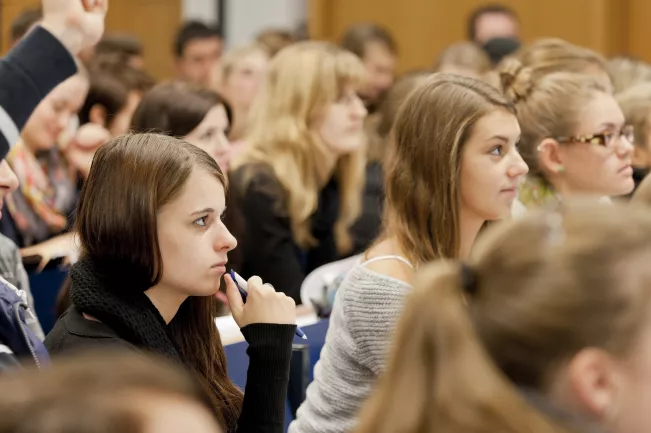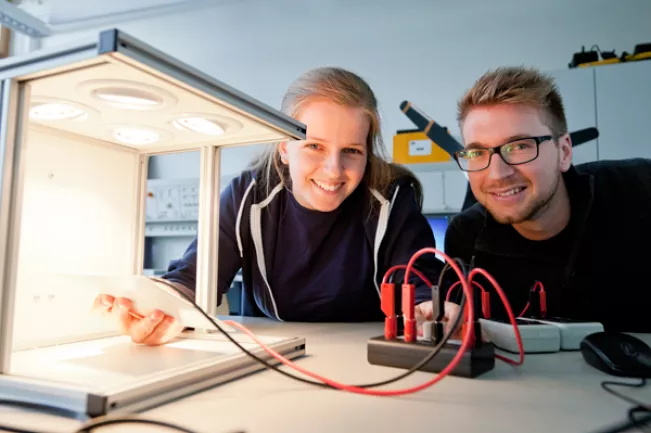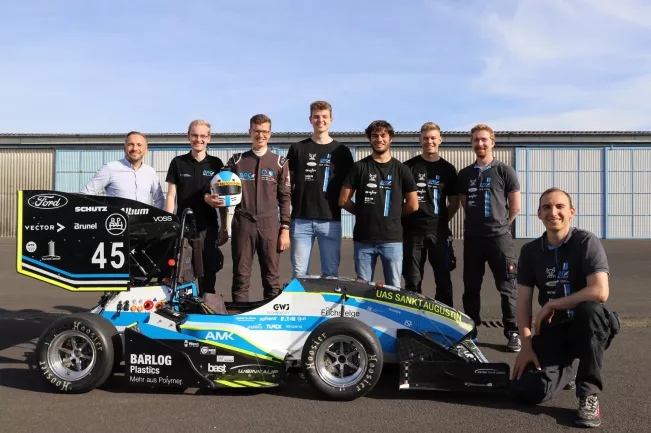Communications and Marketing
Study: Top marks for H-BRS for student satisfaction

In retrospect, how satisfied someone is with their degree programme depends on many factors. The university's facilities play a role, as do the organisation, the supervisors and much more. Contact with other students is also very important. Hochschule Bonn-Rhein-Sieg was able to collect plenty of points from its students in all categories. All in all, 91 per cent of the graduates of the 2018 graduating class are satisfied or very satisfied. This puts H-BRS in first place of all universities surveyed in NRW in terms of student satisfaction.
These and a wealth of other figures have been compiled by the Institute for Applied Statistics (ISTAT). In the recently published study "Study and Career in North Rhine-Westphalia", the institute analyses the academic success and career entry of graduates from the 2018 graduating class. It is the fourth study of its kind, commissioned and financed by the Ministry of Culture and Science of the State of North Rhine-Westphalia. The study also compares universities and universities of applied sciences (HAW) with each other.

Contact with teachers is of great importance
According to the ISTAT study, H-BRS graduates rated the contact with lecturers and the exchange with other students extremely highly. They were hardly less positive about the facilities and the organisation of their studies. With an overall result of 91 per cent, H-BRS clearly sets itself apart from the group of universities of applied sciences in NRW. These, in turn, achieved a better average score for student satisfaction (just under 77 per cent) than the universities. Their graduates in NRW are 69 per cent satisfied with their studies.
The high satisfaction levels at H-BRS are also reflected when looking at the individual subject groups. From social sciences to natural sciences to computer science: since 2014, H-BRS has consistently held first place in the field of universities of applied sciences in all subject groups, in some cases by a large margin.
"The result of the study is remarkable. It is further proof that our combination of excellent teaching, relevant topics and practical relevance continues to be a successful model. Our graduates are not only characterised by a high level of student satisfaction, they are also in high demand on the job market," commented University President Hartmut Ihne on the results.
Standard period of study: H-BRS is significantly faster
One indicator of academic success is adherence to the standard period of study. The study shows: Fewer and fewer students are completing their degree programme within the standard period of study. Only a third of graduates in NRW have reached this target. A comparison with the examination years from 2011 onwards reveals a very clear trend that affects all types of higher education institutions. However, universities of applied sciences also perform better than universities in this area. Students there generally complete their studies within the standard period of study more often than at a university.
The gap between the two types of higher education institution has actually increased over the examination years analysed. Within the group of NRW universities of applied sciences, H-BRS maintains its outstandingly good position: While 39 per cent of students at NRW universities of applied sciences completed the standard period of study, 48 per cent did so at H-BRS. The most frequently cited reasons for delays are the final thesis, own employment and failed exams.

Degree programme and job go together
After graduation, the question arises as to how quickly a job can be found, whether it matches the qualifications acquired and how well it pays. According to the ISTAT study, graduates of universities of applied sciences in NRW spend an average of 3.6 months looking for a job. This seems to give them a slight advantage over university graduates, who need 3.7 months. For most people, the more interesting question is whether their employment matches their degree programme. And here, the figures speak for themselves: 88 per cent of H-BRS graduates are employed in a job that matches their subject 1.5 years after completing their academic degree. This sets H-BRS apart from the average figure for all NRW universities of applied sciences (84 per cent).
It is noticeable that HAW graduates are more likely to go into (full-time) employment after completing their academic degree than their university counterparts. It is also noticeable that the proportion of professionals with personnel and/or budget responsibility is higher among HAW graduates than among university graduates.
Income: HAW degree promises advantages
The saying goes that you don't talk about money. But the study does and offers numerous model calculations on income. Unsurprisingly, a Master's degree promises a higher salary than a Bachelor's degree. There are also differences between university and HAW degrees. The advantage is not on the side of the universities. The arithmetic mean of the gross hourly wage in the group of Bachelor's graduates is 19.46 euros to 16.44 euros, clearly in favour of HAWs. A similar picture emerges for Master's degrees. The ratio there is 24.06 euros to 22.70 euros. And Hochschule Bonn-Rhein-Sieg? A Bachelor's grade report with the H-BRS logo helped the 2018 graduating class earn an average gross hourly wage of 20.92 euros. The Master's certificate from H-BRS earned 25.25 euros. The figures give an idea of the starting salaries, so there is still room for improvement.
The study "Study and Career in North Rhine-Westphalia" examines the academic success and career entry of graduates from the 2018 graduating class. It uses the 2011, 2014 and 2016 classes for comparison and shows results differentiated by type of university. The study refers to "universities of applied sciences" for simplicity's sake. Many of the former universities of applied sciences now use the title "University of Applied Sciences" to emphasise their focus on application-oriented research and teaching.
The results for the 2018 graduating class are based on data from 17,247 graduates from 29 NRW universities and 11,301 graduates from 19 universities in other federal states. H-BRS has been participating in this nationwide research project since 2012, in which graduates are surveyed one to two years after completing their academic degree on their retrospective assessment of their degree programme and their career entry.
The results are based on data from 29 universities in NRW and 11,301 graduates from 19 universities in other federal states
Do you still have questions?

Location
Sankt Augustin
Room
F 220
Address
Grantham-Allee 20
53757, Sankt Augustin
Telephone
+49 2241 865 9637
Location
Sankt Augustin
Room
E 240
Address
Grantham-Allee 20
53757, Sankt Augustin
Telephone
+49 2241 865 9560